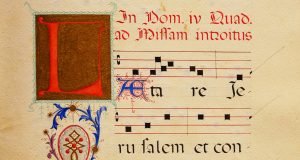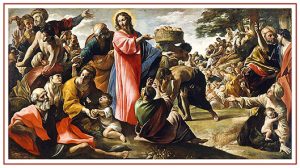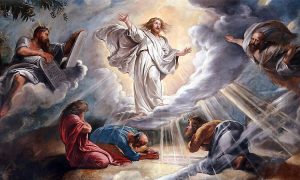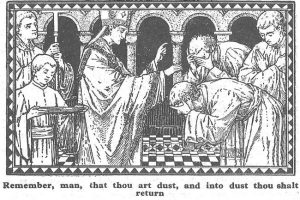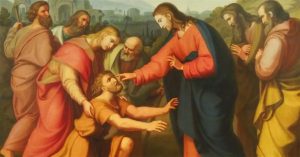Sermon for Laetare Sunday
Preached by The Reverend Richard G. Cipolla,
Pastor Emeritus, Saint Mary’s Church, Norwalk
at the traditional Latin Mass at St. Stanislaus Church, New Haven, 19 March 2023_______________________________________________________________
From the Introit: “Laetare Jerusalem.” Rejoice, O Jerusalem… and from today’s Gradual Psalm: “I rejoiced when I heard them say, let us go into the house of the Lord”. And from the Epistle: “For freedom Christ has set us free.”
In the American psyche there is a strong relationship between freedom and joy. The whole American enterprise, both mythical and historical, has been a celebration of freedom, usually understood in the Enlightenment sense: the freedom of the individual from all coercion, whether that coercion be from the State or from organized religion. It is the freedom to be who you want to be without interference from outside sources. We call ourselves “the Land of the free and Home of the brave.” These basic individual freedoms are enshrined in the United States Constitution. And these freedoms and freedom itself are inextricably linked in the minds of Americans with democracy. Two World Wars were fought–in our understanding– to make the world safe for democracy. And we have seen in the post-World War II period in our history, with its own wars in foreign lands, however imperfectly conceived and fought this wars have been, there has been this sense of duty to see to it that democracy spread thought the whole world, and this, always in the name of freedom. And it is expected that the freedoms enjoyed in a democracy will fulfill the people and make them happy, for the ultimate fulfillment of the individual is to be free.
But we have seen in recent history that even in those places where democracy has been established after decades of dictatorships or some other form of tyranny, there has not been an outpouring of peace and joy based on new freedoms. In so many cases there is chaos with warring factions trying to destroy each other, and all in the name of freedom. To point this out is not to deny the value of democracy as a form of government. It is rather to call attention to a deep forgetting by Catholics about what true freedom is and its relationship to joy and happiness. What Catholics have forgotten is that the secular understanding of freedom is provisional, is relative and can never by a source of true joy. The only source of true joy is that freedom won for the whole world by the Cross of Jesus Christ.
“Rejoice, O, Jerusalem”, sings the Introit. What is Jerusalem in this phrase? It is not the city in the Middle East which despite being holy to three religions, is a place of constant strife and warfare, both religious and secular. The city Jerusalem is certainly the place where Christ entered in triumph—not like a Roman triumph—on Palm Sunday and then was crucified on Good Friday some two thousand years ago. Jerusalem is the place where the Son of God, the Incarnate Word, walked and taught. As such it provides a grounding for the reality of the Incarnation in history and as such, remains important to every Catholic. But it has little to do today with the faith that is the Catholic faith. It is neither an object of our love nor a cause of our joy.
Rejoice, O Jerusalem! What this phrase means in today’s Mass is the new Jerusalem, the heavenly city, that place where the saint defines what Christian freedom really means and where joy finds its place and expression in the worship of the Lamb who sits on the throne with his wounds glowing like gems. I hesitate to call this place heaven, because that word, even so often in the Church, now carries silly religious images, a place according to preachers at many Catholic funerals to which all Catholics go. How many fatuous homilies have we heard by priests and bishops telling the family of the deceased that Joe or Mary are right now in heaven. No—what this Jerusalem means cannot be expressed in words. To even call it a place is misleading, for it is not in time and space but in eternity and hence is beyond our imagination. Those passages in the book of Revelation paint a picture of the New Jerusalem in terms of gold and precious gems, in terms of clouds of incense, in terms of choirs singing praise to the Lamb upon his throne. It is there that there is perfect freedom, for here there is freedom from sin and death, and it is here that there is freedom for life, for life eternal. Here is that perfect freedom that is the service of God for eternity: “whose service is perfect freedom”. Here there is unspeakable joy, the joy of those whose personal fulfillment lies not in what they amassed for themselves, nor in how they feel about themselves, nor in their successful relations with other people, but rather and solely in their fulfillment in God, who alone can and does fill that voice that haunts throughout our lives here on earth.
And yet, Jerusalem here also refers to the anticipation of the New Jerusalem that is the Church. “Gaudete cum Laetitia: rejoice with happiness, you who were in sadness, that you may exult and that you may drink fully from her breasts for your
Consolation”. The Church as our mother. And this not some abstract church but the Catholic Church, the Church that we know from Rome to our own parish church. How downtrodden and forgotten is the reality and image of the Church as our mother because of the scandals of immoral and unfaithful clergy! How marred is the image of the Church as our mother by the vapid self-centered worship that plagues all too many of our parish churches! How sad is the image of the German bishops who in the name of synodality—the buzz word of the decade—to advance claims about marriage and human sexuality that contradict our Lord’s own words in Scripture, questioning the very existence of the priesthood, denying the reality and binding force of the Tradition of the Church that consists of Scripture and the teaching of the Church through 20 centuries in an effort to be in step with a godless world? How un-Christ-like is the image of the Church that has forgotten the mission to evangelize the whole world!
And yet it is the Church that gives us birth to new life in baptism, that offers up the Holy Sacrifice of the Mass for the living and the dead, that feeds us with the body of Christ in the Eucharist, nourishes us by word and sacrament, who cleans our soiled baptismal garments by Confession, who speeds us on our way to eternal life when we die. This is a call today on this Sunday for the Church to rejoice, to rejoice in the knowledge that the ultimate freedom has been bought for us by Christ’s Cross, a freedom that cannot be taken away, a freedom that does not depend on a type of government, a freedom grounded in God, and the only source of joy.
And yet, is it not true that we are tempted to despair, not only because of the state of the world today but also because of the state of the Church? But this temptation comes only because we have forgotten something important. We are tempted to cynicism and despair because we act and think as if we are of this world. We have forgotten—and this is a real sin—that we are IN the world without being OF the world, that our goal is beyond this world, that the ultimate meaning of our life and the lives of those we love and the life of the whole word lies outside this world, not in a romantic and deluded sense, but in the sense founded on the fact that God became man and part of this world and died because of and for this world and rose from the dead and ascended into heaven and there waits for us: “that we too may thither ascend”, as the old Collect for the Feast of the Ascension so wonderfully said.
But can we see in some small way, however fleeting, a hint of this joyous freedom that will be ours in faith? Can we see some intimations of the reality of heaven within the Church? The answer is Yes. It is in the Liturgy, especially in the celebration of Holy Mass, that is where we may experience that real joy in freedom that is found only in heaven. For here, in the Mass of the Tradition of the Church, by means of sight, smell, music, words, silence, archaic language, gestures, all of which binds us to the Tradition of the Church and forces us to deny our own wants and desires, that Sacrifice in which the perfect freedom of God is made present, and when we give ourselves over to what is happening in the Mass here in this time and space for us, we realize what it means to be free, and we catch a glimpse of that joy which will be ours with Mary and all the saints in heaven.

